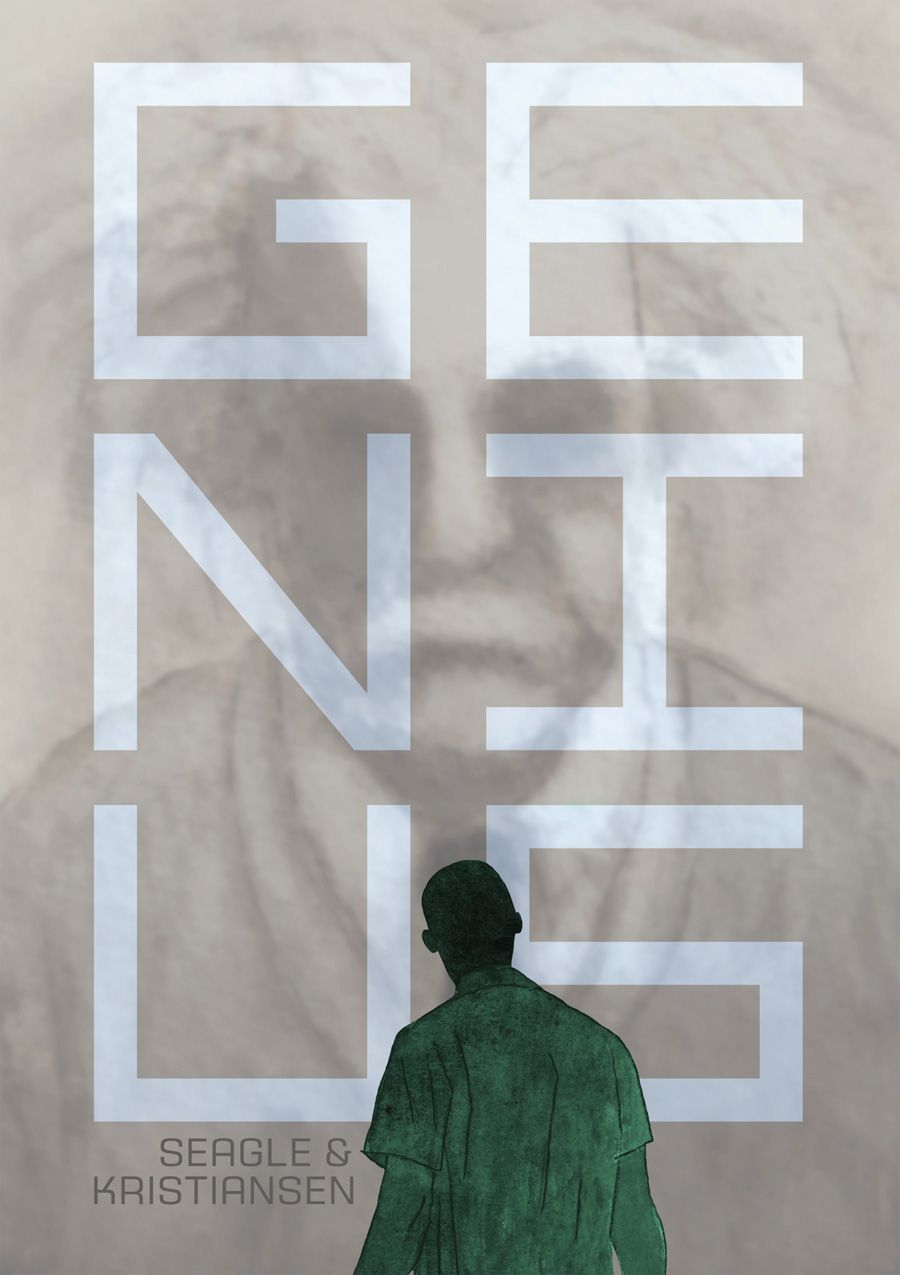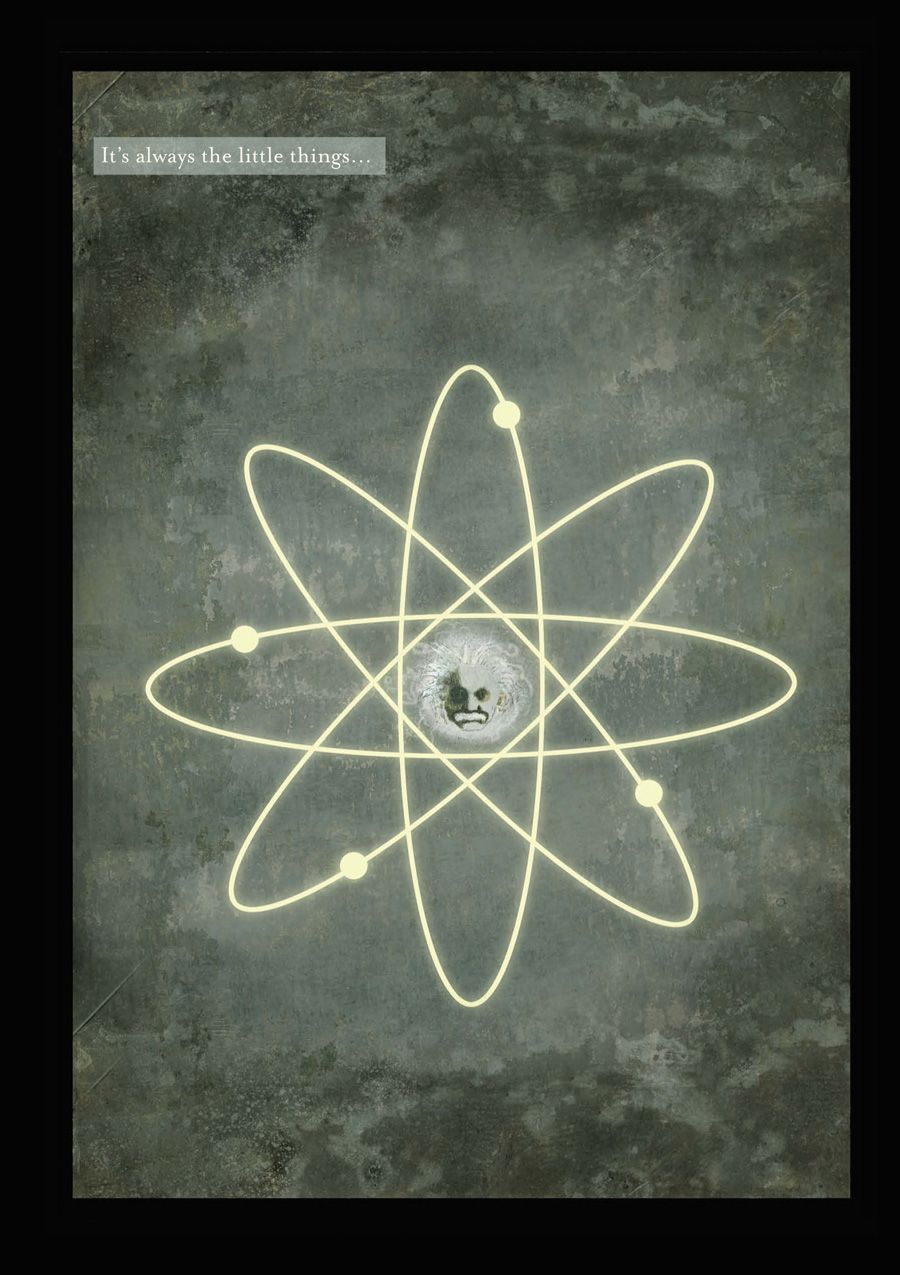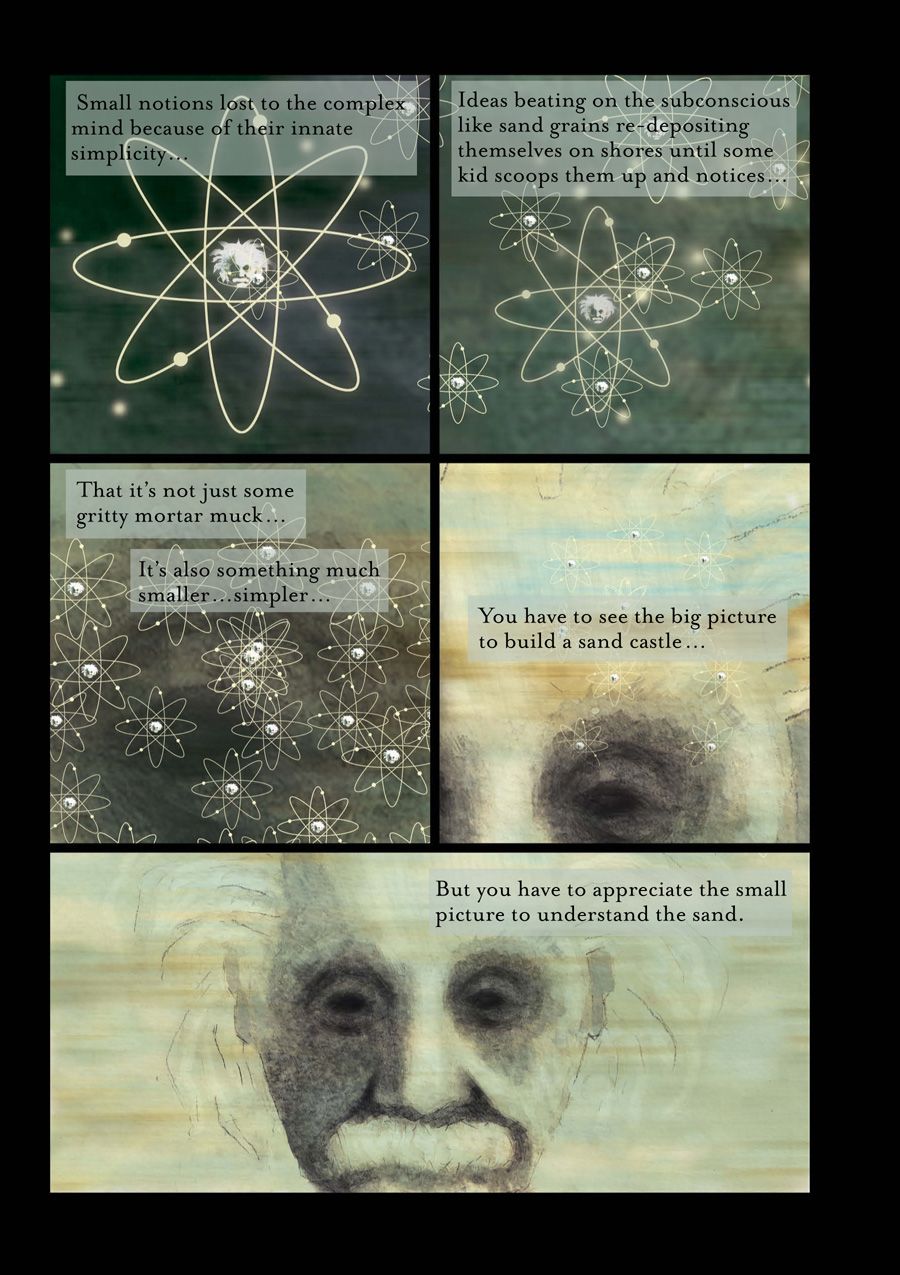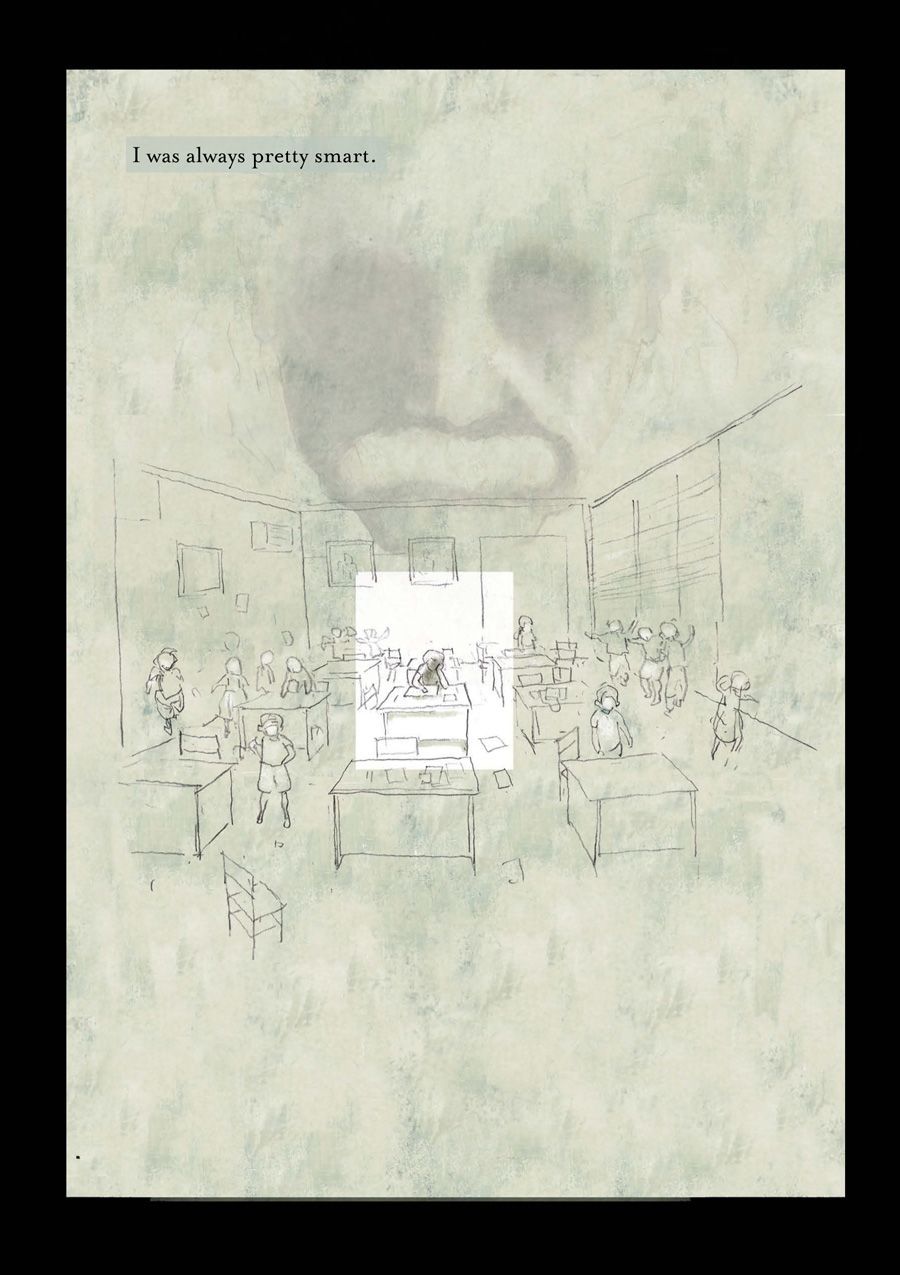If you simply look at it from a bird's eye view, "Genius" could easily be summed up as being about a physicist obsessing about a long lost Einstein theory that only his dementia-riddled father-in-law is privy to. Look closer, however, and you realize you're well into a story about a man lost at sea, a man who cannot navigate the daily rituals of being a husband and a father. Closer still, and you find it's about man deciding what's important in life. That's the genius in writer Steven T. Seagle's and artist Teddy Kristiansen's latest collaboration, available now from First Second.
"Genius" is an original graphic novel that reunites the team from Vertigo's hit "It's a Bird..." and "House of Secrets" to tell the story of a man named Ted at the end of his rope, both at home and at the job. He needs something to help him break on through to the other side -- that extra push that would just solve everything. Enter Einstein, or, in this case, an Idea Einstein had. If Ted can find out what this idea is and somehow use it as his own, then everything it will go back to normal, everything will be OK.
On the eve of the book's release, Seagle spoke with CBR about his work on "Genius," his long-lasting relationship with Kristiansen and the "big gains in small interactions."
CBR News: Steve,where did the idea for"Genius"come from? How long has it been in development?
Steven T. Seagle: The idea for "Genius" came from a trip my wife, Liesel, and I took to Colorado to visit her ailing grandfather, Max, during the last weeks of his life. Because of his time as a military security officer, Max knew the answer to one of the great mysteries of the 20th century, and I became obsessed with trying to get him to tell me that answer before he passed away. "Genius" is about whether lost information might not be better off lost.
As for how long the book was percolating, Teddy and I started talking about "Genius" a year after our Vertigo Superman OGN "It's a Bird..." came out. That would be 2005. I finished the script in 2006, and Teddy started working his artistic magic just after that. After the great reception we got for "It's a Bird...," Teddy and I knew we wanted to do something that would appeal to our new, broader base of readers, but we also didn't want to repeat what we'd just done. So we decided on a kind of a spiritual sequel. I kept a couple of the tropes of "It's a Bird..." -- the semi-autobiographical aspect of the plot, the famous figure "haunting" the story -- but then we went somewhere new with the family story, the thematic compositions and the structural ideas.
How did First Second become involved as the publisher for "Genius" rather than, say, Vertigo?
There was a surprising, to us at least, lack of interest in any kind of follow up to "It's a Bird..." from DC. The book sold well and was received incredibly well. Teddy and I thought the, "Hey! Do a follow-up!" call was coming any minute, but instead -- crickets. I didn't want to lose the creative momentum we'd built up, so I started looking around. Mark Siegel was talking in the press about his new company, First Second, and he had a palpable passion about his intentions that I wasn't hearing anywhere else in the industry at that time. I literally sent Mark a cold-call inquiry letter and he responded almost immediately with an enthusiastic yes to the project. We were planned for the second season of :01. And... then we came out in like the fourteenth season. We put our editor Calista's schedules through the wringer. But Mark stood by us -- even when he shouldn't have -- and now we have this cool book with them. We're very happy.
Like you said, this isn't your first time working withTeddy Kristiansen. His art is particularly fitting for what the main character Ted's going through in the story; his strengths, his weaknesses. What's the collaboration like between the two of you?
Teddy and I have worked together for about 17 years now. We have learned a lot about how each other works. Even better, we have learned how to push each other into spaces where we aren't automatically comfortable creatively. That's where the best stuff comes from. This time around, I worked full script, but threw Teddy a very meditative set of family events on one hand, and an almost incomprehensible set of cosmic level events on the other and just said, "Good luck reconciling all that, Kristiansen!" Teddy responded to the challenge with color -- a very unexpected approach. The book sits in a very subdued palette, but then makes a lot of assertions about the mind and the unknown using sudden eruptions of color. I was actually very concerned when I saw the first set of pages come in. But the mastery of what Teddy had devised became clear when I had the entire book in front of me.
At a very high level,the book is about two geniuses -- Ted and Einstein. But there's more to it, isn't there? All the characters (well, mainly Ted's family) are geniuses in their own way.
Exactly, "Genius" is looking at "the head" in a number of ways. Ted is trapped in the innermost workings of his literal mind and missing the animalistic impulses of his brain he maybe should be responding to. Ted's son, Aron, is a horny teenager, thinking with the head below his belt. Ted's daughter is a burgeoning genius in her own right who would maybe rather just be normal. Ted's wife, Hope, has a problem percolating in her own mind. It's a world where everyone has a "mental problem," and though Ted is the lynch pin, he's lost with thoughts of one of the greatest thinkers of all time, Einstein.
The dialogue between the family members feels so real, so right. Whether it's Ted trying to figure out his son, or the wife's comforting words amidst all the chaos -- how did you nail the voices?
It's been very funny in that a lot of fathers who've read the book in advance have asked if I had the same talks with my son. I don't have any kids yet, so the answer is no. But my wife is a college professor, and I used to be one as well. We've had no end of long talks with young people at all kinds of crossroads in their lives. For me, it's always about listening and remembering what those conversations sound and feel like. Hopefully I get it more right than not.
Day-to-day, shit happens, and sometimes it compounds into something ugly. So I find it very -- again the word here is "real" -- real that you have the main character obsessed with Einstein's secret while all this other stuff is going on, whether it be his son's first steps into a sexual relationship, or his daughter's bullying. Why run him through the wringer like that?
One of the main things Ted keeps missing in the book is what is actually important. He, like many of us, is so trained by this culture to look for big picture stuff that he's missing the little things that are just as, if not more, important. I feel like we have put too much stock in the idea of every kid being a star, or the president, or some other unlikely overly-aspirational accomplishment. That's what success looks like in the 21st century. It's not enough to be a good singer in a local choir. You have to be a national "idol." It's a ludicrous standard. There are big gains in small interactions. Ted's salvation depends on him being able to get to that realization before his time runs out.
Who do you think has the biggest impact on Ted in the story?
Certainly my favorite relationship in the story is between Ted and his dementia-riddled father-in-law, Francis. These two guys are oil and water -- maybe oil and salt water! I'm constantly advising upcoming creative people that the entertainment industry is a relationship business more than it is a talent business. You have to be able to get along with people to make it work. In "Genius," Ted is a physicist, but what he needs most from Francis -- a lost Einstein theory that his father-in-law inexplicably knows -- requires that Ted make their completely dysfunctional relationship function. That's not how Ted's mind works. It's a tough lesson that if you've poisoned a relationship in the past, you're going to have an almost impossible time mining it in the future.
Who's your Einstein?
In terms of writing, I have a few, and they tend to be creators who flipped the table over instead of sitting at it. Francois Truffaut resonates with me. When you reference the story in "Genius" being "real," that's me channeling Truffaut's energy for "The 400 Blows." My constant desire to mess with the structure of stories -- take a left turn in a plot when it calls for a right -- I chalk up to my admiration for composer Igor Stravinsky's badass attempts to liberate rhythm from meter in classical music.
Visually, when I wrote this script for Teddy, I was fixated on the stage pictures Robert Wilson created for "The Black Rider," a bizarre opera/musical/monster-show for the stage created with William S. Burroughs and Tom Waits. I'm always looking for new geniuses to draft -- I'm not one, but I can definitely learn from them.





